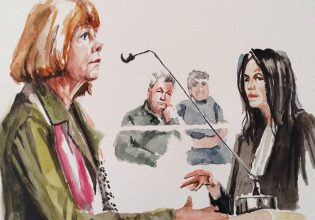Society continues to seek out the Left
Society has turned its back on leftist parties, but not on the Left itself
*The second of 4 chapters on what the Left is today.
An entire debate has swirled for a long time, and from various quarters, over the fact that societies have turned their backs to the Left.
Indeed, some analysts don’t just cite certain electoral results, but a deeper ideological shift in modern societies.
According to this narrative, societies are no longer attracted to ideals of radical democratization, social equality and profound social change. On the contrary, when they are not comfortable with the ‘normality’ of ‘existing neoliberalism’, they seek more authoritarian and conservative solutions. Political discourse boils down to the fact that societies have turned their backs on the Left.
Various examples are cited in support of this claim: from Donald Trump and his appeal to sections of the white working classes in areas affected by de-industrialization, to the way Marine Le Pen’s National Rally represents much of the traditional working classes, which in earlier times were represented by the French Communist Party.
This is also reinforced by the constant invocation of great political failures of the past decade in Europe. The failure, and now crisis, of Syriza party, the failure of Podemos to bring about a political change, the way that Jeremy Corbyn not only lost the Labour Party’s leadership, but how today Keir Starmer is completely purging the latter party of any connection to left-wing references.
In other cases, this supposed breakdown in the left’s relationship with society is presented in triumphalist terms; as a victory in the struggle of ideas and political concepts; in other instances it’s presented as the main reason for the rise of the far right through the infamous theory of the “two extremes”.
I have no objection to agreeing that there’s indeed a problem in the relationship between certain left-wing parties and wider groups in society.
This, in some instances, has to do with the policies pursued by these parties. In other words, when, for example, SYRIZA is held responsible for implementing a memorandum bailout, in defiance of the will of the people, it’s to be expected that this will lead to problems in its relationship with broader segments of the population. The same applies to various parties that claim to be left-wing, who «feel» center-left and, in reality, whose policies are neoliberal.
In other instances it has to do with the situation of the working classes. It is true that large segments of the working classes, in particular, are in a state of confusion. They no longer accept the «educational» influence that the variations of the historic leftist currents could have. They are experiencing the effects of a more generalized cultural crisis. They are more frightened than determined, and thus more easily wind-up exercising practices of «social cannibalism». The far right has worked systematically to win them over and this, in turn, means the reproduction of forms of such politicization.
All this is real, but does it also mean the end of the Left’s relationship with society?
Such a notion would be premature and dangerous to say. In the first place, to say this is to admit, in advance, that the working classes, wage-earners, farmers, the unemployed, college students and scientists have suddenly decided that they are no longer interested in a better distribution of wealth; better work conditions, salaries, and not be subject to police arbitrariness; to enjoy free education and healthcare, and to live in democracies where the word of citizens counts.
Because when we talk about «right» and «left», we are not talking about «identities», nor especially about «historical currents». We are talking about what societies ask for. And if one looks at Greek society, one will find that there are still strong demands for justice and democracy. If someone talks with people and has the patience to listen to what they say, he will find the same demand and the same anxiety. I’m not saying that one will find only that; one will also find racism and will encounter sexism strong conservative reactions. But the dominant thing one will encounter will be anxiety about whether the world can be better, less dangerous, less insecure.
Neoliberalism cannot respond to these concerns because the core of its social proposal is greater inequality, more insecurity, and greater risk for the future. Because even where it generated growth, it did not bring more justice, nor equality, nor a sense of a society of solidarity and a true welfare state.
Add to these other demands that are emerging, such as climate change, which has proven beyond all doubt that problem cannot be addressed only on market terms, the open question of emancipation from patriarchy, the need for truly inclusive policies for LGBTI+ people, and we see other dynamics and demands emanating from society.
If, however, these demands, anxieties, demands, claims still exist, then – in essence – there is still a demand of the left. A demand for political discourse, assertion and collective organization that I don’t know if it can be described in any other way. I can accept any debate about whether we are talking about the existing left, or whether a new left needs to be re-established, but I cannot accept the arrogance about the «end of the left». However, for the left to meet again with society there are conditions. The left must change, society must change. And this means another way of organizing, another way of exercising politics.
The continuation will be the sequel to the next one.
PS. “And if it were said of us that we’re almost romantics, that we are incorrigible idealists, that we think the impossible: then a thousand and one times we have to answer ‘yes we are’.”
Che Guevara
The first of 4 chapters on what the Left is today: Neither history nor the Left has ended
- Θρίαμβος της Μπόρνμουθ στο «Ολντ Τράφορντ» (3-0) – Γκέλα για την Τσέλσι (0-0)
- Βραζιλία: Τουλάχιστον δέκα νεκροί σε συντριβή μικρού αεροπλάνου
- Artemas και Διαμαντής: Ο Κύπριος viral τραγουδιστής που ακούει ο Ομπάμα και όλο το TikTok, έχει ορμή
- Γάζα: Οικογένειες ψάχνουν καθημερινά στα σκουπίδια για να φάνε, λέει η UNRWA
- LIVE: Παναθηναϊκός – Athens Kallithea
- Μαγδεμβούργο: Τα κενά ασφαλείας και οι προειδοποιήσεις που αγνοήθηκαν












